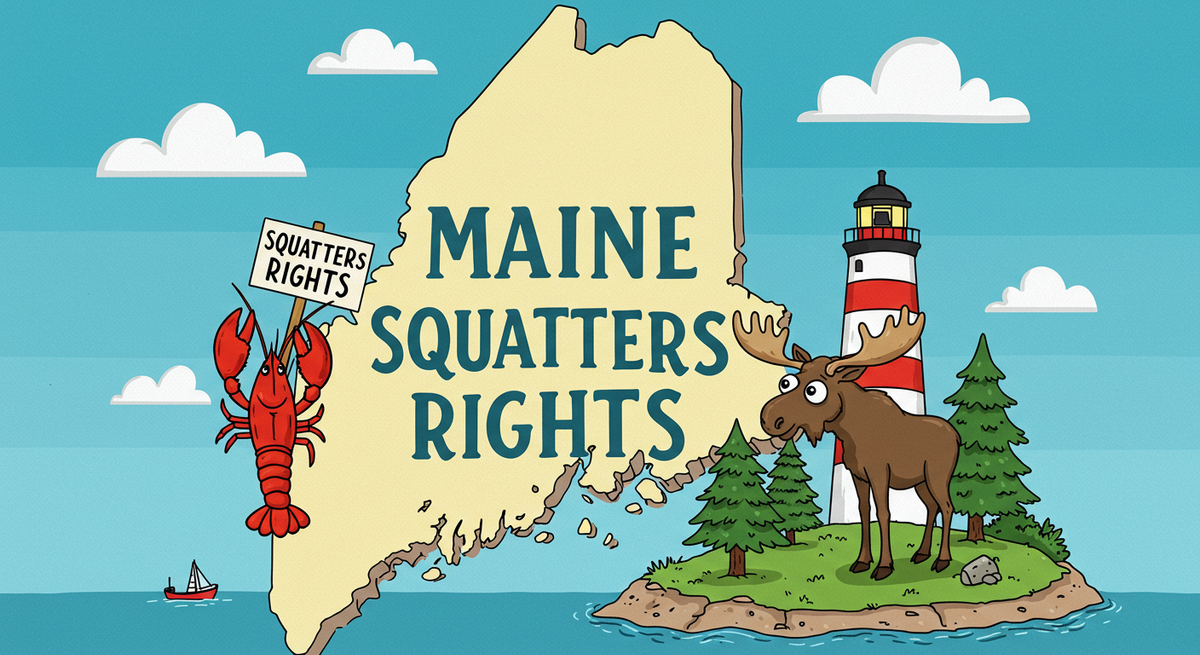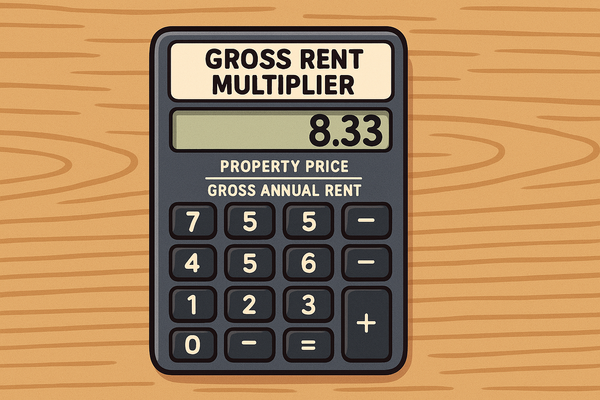Maine Squatter's Rights Guide: 2025 Laws and Property Protection Strategies
Possession in Maine must be actual, open, notorious, exclusive, hostile, and continuous for the entire 20-year period

Maine property law presents unique challenges for property owners concerned about squatters. With a lengthy 20-year adverse possession period, the Pine Tree State offers stronger protections than many others, but vigilance remains essential to protect your real estate investments from unauthorized occupation.
For property owners, understanding Maine's squatter rights laws is crucial to safeguard your property against potential adverse possession claims and prevent the complexities of removing unwanted occupants.
Key Takeaways
- Maine requires squatters to occupy property continuously for 20 years before they can file an adverse possession claim
- Possession must be actual, open, notorious, exclusive, hostile, and continuous for the entire 20-year period
- Unlike some states, Maine generally doesn't require squatters to pay property taxes to make adverse possession claims
- The "open and notorious" requirement prevents secretive occupants (like the North Pond Hermit) from claiming property rights
- Regular property inspections and security measures are the best prevention against squatters
- Maine's 20-year timeframe provides stronger property owner protections than many neighboring states
But First... A Squatter Snippet
Maine's Infamous Woodland Phantom: Christopher Knight—the legendary "North Pond Hermit"—survived 27 years in Maine's wilderness while burglarizing vacation cabins over 1,000 times without detection. His remarkable stealth (never lighting fires, memorizing "rock to root to rock" pathways) ultimately disqualified him from adverse possession claims. Despite exceeding Maine's 20-year timeline, Knight's deliberate secrecy failed the critical "open and notorious" requirement—proving that successful squatters must be seen, not concealed.
Understanding Maine Squatter Rights in 2025
In Maine, squatting itself isn't legal, though squatters have historically held certain rights through the doctrine of adverse possession. This legal principle allows individuals who occupy abandoned or neglected property without permission to potentially gain legal ownership after meeting specific conditions over a designated period.
It's important to distinguish between squatting and trespassing. While trespassing is a criminal offense involving unauthorized entry onto property, squatting typically involves someone living on a property for an extended period without authorization. This distinction significantly affects how law enforcement responds to each situation.
The foundation of Maine's adverse possession laws is codified in ME Tit. 14 §§ 801, which establishes the 20-year timeframe and specific requirements that must be met before a squatter can initiate a "quiet title" action to establish ownership against competing claims.
Maine Adverse Possession Requirements
For a squatter to claim legal ownership through adverse possession in Maine, they must satisfy five stringent requirements for the full 20-year period:
Open and Notorious
The occupation must be visible and obvious to anyone, including the rightful owner. This prevents hidden or secretive occupation from qualifying for adverse possession. The squatter must live openly as if they were the rightful owner.
Continuous
The squatter must occupy the property continuously for 20 years without interruption. Any temporary abandonment resets the clock on the adverse possession claim. This 20-year timeframe is longer than many other states require.
Exclusive
The possession must be exclusive, meaning the squatter cannot share the property with others, including the rightful owner. The squatter must have sole control over the property.
Actual
The squatter must physically occupy the property and treat it as their own. This includes maintaining the property, making improvements, or otherwise demonstrating actual possession. Simply claiming the property without physical occupation is insufficient.
Hostile
In legal terms, "hostile" doesn't imply aggression but rather indicates that the occupation is without the owner's permission and against their rights. This can include situations where the squatter honestly believes they have a right to the property due to a misunderstanding or error.
Unlike some states, Maine generally doesn't require squatters to pay property taxes during the occupation period to make an adverse possession claim, except in cases involving "uncultivated lands in unincorporated areas."
The North Pond Hermit: Maine's Most Extraordinary Squatter Case
The case of Christopher Knight, known as the "North Pond Hermit," represents one of Maine's most fascinating squatter stories. For 27 years, Knight lived in complete isolation in the Maine woods, sustaining himself through an estimated 1,000 burglaries of nearby vacation cabins.
Despite exceeding the 20-year timeframe for adverse possession, legal experts agreed Knight could never have successfully claimed ownership of his campsite. His secretive existence failed to meet the crucial "open and notorious" requirement, as he deliberately concealed his presence rather than openly occupying the land as if he were the rightful owner.
Knight's remarkable story illustrates the importance of the "open and notorious" requirement in Maine's adverse possession law. Even after nearly three decades of continuous occupation, his deliberate efforts to remain hidden disqualified any potential adverse possession claim he might have made.
Prevention Strategies for Maine Property Owners
Preventing squatters from establishing residence on your property is significantly easier than removing them after they've settled in. Maine property owners should implement comprehensive preventative measures to protect their investments.
Regular Property Monitoring and Maintenance
Regular property inspection serves as your first line of defense against potential squatters. Frequent visits to your property allow you to detect unauthorized occupants early, before they can establish a pattern of residence. Real estate experts recommend inspecting at least every couple of weeks, especially for vacant properties.
Additionally, maintaining the appearance of active occupation can deter squatters. This includes:
- Arranging for mail and newspaper delivery
- Installing light timers
- Ensuring lawns and outdoor spaces remain well-maintained
- Removing accumulations of flyers or advertisements
Physical Security Measures
Installing robust security systems provides tangible protection against unauthorized entry:
- Motion-sensor lighting
- Security cameras
- Quality locks on all doors and windows
- Clearly visible "No Trespassing" signs (which serve as both legal notice and psychological deterrent)
Community and Professional Support
Building a network of vigilant neighbors can significantly enhance your property's security:
- Provide adjacent neighbors with your contact information
- Ask them to report any suspicious activity they observe
- Consider joining neighborhood watch programs
For landlords who cannot regularly monitor their properties, hiring a professional property management company can be invaluable. Their routine presence and property maintenance activities help deter squatters while ensuring early detection of any unauthorized occupancy.
Legal Process for Removing Squatters in Maine
If squatters have already occupied your property, understanding the proper legal procedures for their removal is essential to avoid potential liability or delays.
Legal Eviction Process
In Maine, squatters must be removed through the formal eviction process, not through self-help measures:
- Provide Proper Notice: Issue a 7-Day Notice to Quit for nonpayment of rent or a 30-Day Notice to Quit for other lease violations
- File Eviction Complaint: If squatters remain after the notice period expires, file an eviction complaint with the courts
- Court Hearing: Squatters have the opportunity to attend a hearing and present a defense
- Writ of Possession: If the court rules in your favor, it will issue a writ of possession
- Sheriff Enforcement: Only a sheriff—not police officers—has the legal authority to physically remove squatters from a property after a writ of possession is obtained
Critically, police do not have jurisdiction to remove squatters in Maine, even if they are clearly trespassing, as squatting is considered a civil rather than criminal matter.
Critical Considerations During Removal
When dealing with squatters, landlords must avoid several pitfalls that could complicate the eviction process:
- Never attempt to forcibly remove squatters yourself, as this could expose you to civil liability or even criminal charges
- Avoid accepting any payments from squatters, as this could potentially transform their legal status from trespassers to tenants
- Maintain detailed documentation of all interactions with the squatters and evidence of their unauthorized occupation
Comparing Maine to Other States
Maine's 20-year adverse possession period places it among the states with longer timeframes, offering relatively strong protection for property owners compared to many other states.
New England Comparison
Within New England, Maine's adverse possession laws are comparable to some neighbors but more stringent than others:
- Massachusetts and New Hampshire both require 20 years of continuous occupation, matching Maine's timeframe
- Vermont and Connecticut have shorter adverse possession periods of 15 years
- Rhode Island has one of the shortest periods in New England at only 10 years
National Contrasts
Nationally, Maine's 20-year requirement provides stronger property owner protections than many states:
- New Jersey requires squatters to occupy property for 30 years
- Ohio and Pennsylvania require 21 years
- Louisiana requires 30 years of continuous occupation (10 years with "color of title")
- California and Montana both require only 5 years with paid property taxes
- Arizona allows adverse possession claims after just 3 years if the squatter has paid property taxes
Frequently Asked Questions
General Squatter Rights Questions
Q: What are squatter's rights in Maine? A: Squatter's rights refer to adverse possession laws that potentially allow someone to claim ownership of property after occupying it openly, continuously, and without permission for 20 years while meeting specific legal requirements.
Q: Is squatting illegal in Maine? A: Yes, unauthorized occupation of property is illegal in Maine. Squatting is generally considered a civil matter rather than criminal, requiring property owners to pursue eviction through proper legal channels.
Q: How long does someone have to squat on property in Maine to claim ownership? A: In Maine, a squatter must continuously occupy a property for 20 years before they can file an adverse possession claim. They must also meet several other requirements, including actual, open, notorious, exclusive, and hostile possession.
Q: Do squatters have to pay property taxes in Maine? A: Unlike some states, Maine generally doesn't require squatters to pay property taxes during the occupation period to make an adverse possession claim, except in cases involving "uncultivated lands in unincorporated areas."
Prevention and Removal
Q: How can I prevent squatters from occupying my property? A: Regular property inspections, security systems, property maintenance, "No Trespassing" signs, and professional property management are effective prevention strategies.
Q: How do I remove squatters from my property in Maine? A: Property owners must follow the formal eviction process, including providing proper notice, filing an eviction complaint with the courts, obtaining a writ of possession, and having the sheriff enforce the writ.
Q: Can I physically remove squatters myself? A: No. Self-help evictions are illegal in Maine. Property owners must use legal processes through formal eviction procedures to remove unauthorized occupants.
Q: Can I turn off utilities to force squatters to leave? A: No. Turning off utilities is considered a self-help eviction tactic and is illegal in Maine. This could potentially expose you to legal liability.
Conclusion
As a Maine property owner, vigilance and knowledge of the state's adverse possession laws are your most valuable tools in protecting your property rights. The 20-year requirement for adverse possession provides substantial protection compared to many other states, but this should not lead to complacency.
Regular monitoring, proper security measures, and swift legal action against unauthorized occupants remain essential practices. Should you discover squatters on your property, remember to follow the legal eviction process and rely on authorized officials for enforcement.
The best protection remains prevention—regular property inspections and maintenance significantly reduce the likelihood of squatter situations developing. For specific legal guidance tailored to your situation, consulting with a real estate attorney familiar with Maine property law can provide valuable direction and peace of mind.
Maine Statutes and Legal Resources
- Maine Legislature: Title 14, Chapter 723 - Adverse Possession
- Maine Statutes § 14-812: Adverse Possession
Legal Disclaimer: This article provides general information and does not constitute legal advice. Consult with a qualified attorney for guidance on your specific situation.





